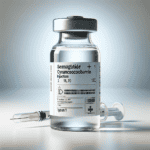
What Is A Semaglutide Compounding Pharmacy?
What Is A Semaglutide Compounding Pharmacy? Semaglutide is a medication that has gained significant attention in the field of personalized medicine. It is a glucagon-like peptide-1 (GLP-1) receptor agonist that is used in the treatment of type 2 diabetes and weight loss.
Compounding pharmacies, on the other hand, are specialized pharmacies that can customize medications to meet the specific needs of individual patients. The combination of Semaglutide and compounding pharmacies has the potential to revolutionize personalized medicine by providing tailored treatments for patients.
The Benefits of Personalized Medicine
Personalized medicine is an approach to healthcare that takes into account an individual’s unique genetic makeup, lifestyle, and environmental factors when determining the most effective treatment plan. This approach has several advantages over traditional medicine. Firstly, personalized medicine allows for more accurate diagnoses and targeted treatments. By considering an individual’s specific genetic markers, doctors can identify the underlying causes of diseases and develop treatment plans that address those causes directly.
Secondly, personalized medicine can lead to better patient outcomes. By tailoring treatments to individual patients, doctors can optimize the effectiveness of medications and minimize side effects. This can result in improved patient adherence to treatment plans and better overall health outcomes.
How Semaglutide is Used in Diabetes Treatment
Semaglutide is a GLP-1 receptor agonist that works by stimulating insulin secretion and reducing glucagon production in the body. It is used in the treatment of type 2 diabetes to help lower blood sugar levels and improve glycemic control. Semaglutide is typically administered as a once-weekly injection.
One of the key benefits of Semaglutide over other diabetes medications is its efficacy in lowering blood sugar levels. Clinical trials have shown that Semaglutide can significantly reduce HbA1c levels, which is a measure of long-term blood sugar control. Additionally, Semaglutide has been shown to promote weight loss, which is beneficial for patients with type 2 diabetes who often struggle with obesity.
The Role of Compounding Pharmacies in Personalized Medicine
Compounding pharmacies play a crucial role in personalized medicine by providing customized medications for individual patients. These pharmacies have the ability to combine different active ingredients, adjust dosages, and create alternative dosage forms to meet the specific needs of patients. This allows for personalized treatment plans that take into account factors such as allergies, sensitivities, and individual preferences.
Compounding pharmacies can also create medications that are not commercially available or have been discontinued by pharmaceutical manufacturers. This is particularly important for patients with rare diseases or conditions that require specialized treatments. By working closely with healthcare providers, compounding pharmacies can develop unique formulations that meet the specific needs of these patients.
The Challenges of Traditional Drug Manufacturing
Traditional drug manufacturing processes are designed to produce medications in large quantities for mass distribution. While this approach is efficient and cost-effective, it does not allow for customization or individualization of medications. Pharmaceutical manufacturers produce medications in standardized dosages and forms, which may not be suitable for all patients.
Additionally, traditional drug manufacturing processes can be slow and inflexible. It can take years for a new medication to go through the research, development, and approval process before it becomes available to patients. This can be a significant barrier for patients who require immediate access to personalized treatments.
The Advantages of Compounding Semaglutide

Compounded Semaglutide
Compounding Semaglutide offers several advantages over traditional drug manufacturing. Firstly, compounding pharmacies can customize the dosage and form of Semaglutide to meet the specific needs of individual patients. This allows for more accurate dosing and improved patient adherence to treatment plans.
Secondly, compounding Semaglutide can provide access to alternative dosage forms that may be more convenient or tolerable for patients. For example, some patients may prefer a transdermal patch or a sublingual tablet instead of an injection. Compounding pharmacies can create these alternative dosage forms to improve patient comfort and compliance.
The Safety and Efficacy of Compounded Semaglutide
The safety and efficacy of Semaglutide have been well-established through clinical trials and real-world studies. Compounding Semaglutide does not compromise its safety or efficacy as long as the compounding pharmacy follows strict quality control measures and uses high-quality ingredients.
Compounding pharmacies are regulated by state boards of pharmacy and must comply with strict quality standards. They are required to use ingredients that meet the same standards as those used by pharmaceutical manufacturers. Additionally, compounding pharmacies must adhere to good manufacturing practices to ensure the safety and efficacy of compounded medications.
The Future of Personalized Medicine with Semaglutide Compounding Pharmacies
The combination of Semaglutide and compounding pharmacies has the potential to revolutionize personalized medicine. By leveraging the benefits of personalized medicine and the flexibility of compounding pharmacies, healthcare providers can develop tailored treatment plans that optimize patient outcomes.
Semaglutide compounding pharmacies can improve patient adherence to treatment plans by providing customized dosages and alternative dosage forms. This can lead to better glycemic control and improved overall health outcomes for patients with type 2 diabetes.
Regulatory Considerations for Compounding Semaglutide
Compounding Semaglutide requires compliance with regulatory guidelines to ensure patient safety and efficacy. Compounding pharmacies must follow the regulations set forth by state boards of pharmacy, which include quality control measures, ingredient sourcing, and documentation requirements.
It is important for compounding pharmacies to work closely with healthcare providers to ensure that they are aware of any regulatory considerations specific to Semaglutide compounding. By staying up-to-date with regulatory guidelines, compounding pharmacies can provide safe and effective compounded Semaglutide to patients.
Conclusion: What Is A Semaglutide Compounding Pharmacy?
In conclusion, Semaglutide compounding pharmacies have the potential to revolutionize personalized medicine by providing tailored treatments for patients. Personalized medicine offers several advantages over traditional medicine, including more accurate diagnoses and targeted treatments.
Semaglutide is a medication that is used in the treatment of type 2 diabetes and has several benefits over other diabetes medications. Compounding pharmacies play a crucial role in personalized medicine by providing customized medications for individual patients.
While there are regulatory considerations for compounding Semaglutide, compounding pharmacies can comply with these regulations to ensure patient safety and efficacy. The healthcare industry should embrace personalized medicine through compounding pharmacies to improve patient outcomes and revolutionize the field of medicine.






